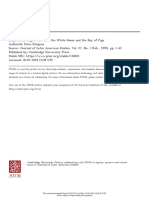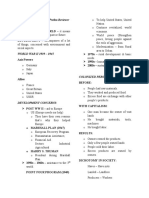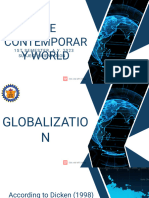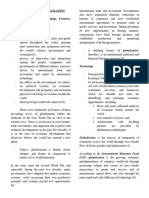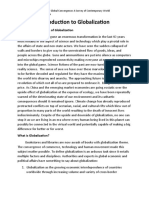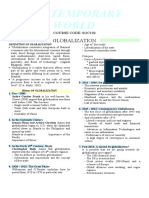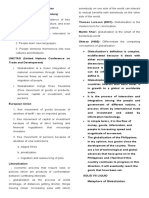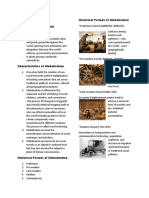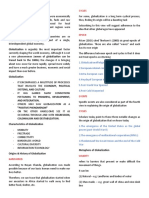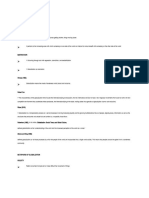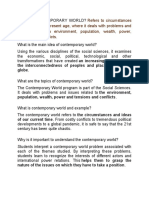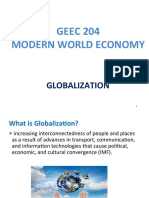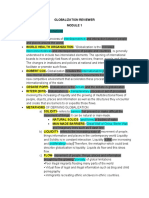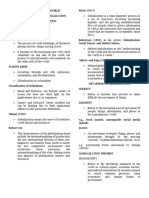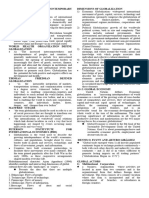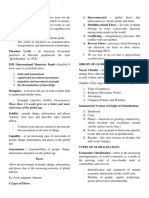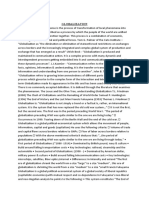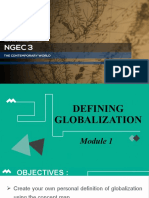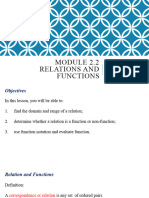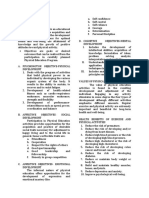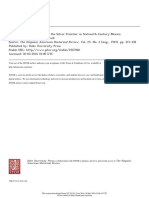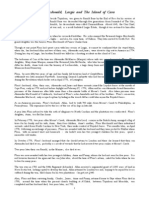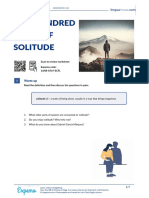CONTEMP
CONTEMP
Uploaded by
Shona AquinoOriginal Description:
Copyright
Available Formats
Share this document
Did you find this document useful?
Is this content inappropriate?
Copyright:
Available Formats
CONTEMP
CONTEMP
Uploaded by
Shona AquinoCopyright:
Available Formats
WORLD WAR II FRENCH REVOLUTION (Isbister)
1939-1945 1st Estate (political power)
AXIS POWERS 2nd Estate (political power)
Germany, Italy, Japan 3rd Estate (tiers etat)
ALLIES COLD WAR (Pletch)
France, Great Britain, United States, USSR 3rd world – areas of the world (mostly former colonies)
that the two worlds wanted to gain
DEVELOPMENT CONCERNS:
Third World
✔ Post WW II – aid to Europe
Underdeveloped and poor countries characterized by:
✔ 1950s-1960s – assistance to the 3rd world
▪ High unemployment
✔ 1970s- rural development & basic needs
▪ Famine
✔ 1990s – human development
▪ Overpopulation
✔ 2000s – sustainable development
▪ Economic instability
COLONIZED PERSPECTIVE
▪ Oppression
BEFORE: With capitalism
GLOBALIZATION
PEOPLE HAD RAW MATERIALS: One man became the
owner of vast The existence of free exchange of goods,
services, culture, and even people, between
THEY WORKED AND PRODUCED FOOD: lands
and among countries (Levitt, 1983)
EXCESS FOOD ARE EXCHANGED WITH: He bought The increased interconnectedness and
materials, tools, machines interdependence of peoples and countries, is
generally understood to include two inter-
OTHER PEOPLE'S PRODUCTS: He bought labor related elements: the opening of international
COLONIZED PERSPECTIVE borders to increasingly fast flows of goods,
services, finance, people and ideas; and the
Results: changes in institutions and policies at national
Owners owned the products and international levels that facilitate or
promote such flows (WHO)
Only a few people owned lands The growing interdependence of the world’s
economies, cultures, and populations, brought
People sold their labor
about by cross-border trade in goods and
Excess products are owned by owners services, technology, and flows of investment,
people, and information (Peterson Institute for
International Economics)
The closer integration of national economies
through trade and financial flows as well as
cross-border migration of people . As national
economies open up and lower their external
barriers, they become more exposed –and more
vulnerable –to global forces and influences.
(United Nations Conference on Trade and
THE THREE WORLDS Development)
1. Globalization is about liberalization & global
integration of markets
FOUR FREEDOMS (European Union)
2. Globalization is inevitable & irreversible
1. Free movement of goods or products. –made
possible by liberalization or the abolition of tax on 3. Nobody is in-charge of Globalization
imported goods (tariff)
4. Globalization benefits everyone
2. Free movement of capital or investment. – made
5. Globalization furthers the spread of democracy
possible through deregulation/ the lifting of strict
banking and financial regulations. 6. Globalization requires war on terror
3. Free movement of services. Aspects of Globalization
4. Free movement of persons. -achieved through the POSITIVE
loosening or abolition of visa restrictions and barriers to
migration 1. Multiculturalism & multilingualism
2. Free Trade
GLOBALIZATION VS. INTERNATIONALIZATION 3. Cultural & educational exchanges
≡ Internationalization-processes and systems that 4. Migration
pertain to relationships between nation-states (Timor 5. Global cooperation
Leste, Brexit)
≡Globalization-processes and systems related to global
social relations or interactions between and/or NEGATIVE
transnational entities. (ASEAN and EU, UNESCO) 1. Linguistic hegemony of English
2. Cultural homogenization
PERSPECTIVES ON GLOBALIZATION 3. Third World dependence on First World
Anti-globalization: objectives 4. Global income and wealth inequality
End the highly imbalanced system that favors 5. Tax injustice
the First World over the third world,
Corporations over citizens & communities 6. racism and anti-immigrant sentiment
Profit-seeking over environmental sustainability
Alter-globalization: objective
Change the current system of globalization
Make it:
1. more humane
2. more pro-environment
3. more grassroots-driven (rather than top-down)
Globalization benefits everyone
You might also like
- The Interstate SystemDocument4 pagesThe Interstate SystemephreenNoch keine Bewertungen
- Corvus 2Document4 pagesCorvus 2Joshua Reyes100% (1)
- Ships in The NightDocument43 pagesShips in The Nightboston_nyNoch keine Bewertungen
- Patriot Viewing Guide and ProjectDocument5 pagesPatriot Viewing Guide and ProjectshaunNoch keine Bewertungen
- CW Prelim ReviewerDocument4 pagesCW Prelim ReviewerJeanelle PaduaNoch keine Bewertungen
- Globliztion Media CultureDocument8 pagesGlobliztion Media CultureKva KhadarNoch keine Bewertungen
- Chapter 1 4Document165 pagesChapter 1 4Lex BactolNoch keine Bewertungen
- Midterm Ge8Document11 pagesMidterm Ge8may qtNoch keine Bewertungen
- GE 03 ReviewerDocument6 pagesGE 03 ReviewerMark James Dela CruzNoch keine Bewertungen
- Contemp ReviewerDocument9 pagesContemp ReviewerBarako Home BlendNoch keine Bewertungen
- Lecture 1 GlobalizationDocument26 pagesLecture 1 GlobalizationCamille SalmasanNoch keine Bewertungen
- Globalization: Movement of Goods, Capital, ServicesDocument11 pagesGlobalization: Movement of Goods, Capital, ServicesMohammad SumaNoch keine Bewertungen
- Contemp RevDocument9 pagesContemp RevNubskie 314Noch keine Bewertungen
- GlobalizationDocument7 pagesGlobalizationFor GdriveNoch keine Bewertungen
- OWN NOTES IN TCWDocument11 pagesOWN NOTES IN TCWBea AndreaNoch keine Bewertungen
- SOC SCI 103 ContemporaryDocument63 pagesSOC SCI 103 Contemporarykyleeawakan100% (1)
- Lecture 1 Globalization 1Document27 pagesLecture 1 Globalization 1ragingtomato32401Noch keine Bewertungen
- Week 3 Module Contemporary WorldDocument2 pagesWeek 3 Module Contemporary Worldkassel PlacienteNoch keine Bewertungen
- Ngec 3 ReviewerDocument11 pagesNgec 3 ReviewerSHAINE ANN BADILLANoch keine Bewertungen
- CONTEMPORARY WORLD and READING IN PHIL HISTORYDocument7 pagesCONTEMPORARY WORLD and READING IN PHIL HISTORYCjeyy LimpatNoch keine Bewertungen
- Reviewer GED 104 - The Contemporary WorldDocument11 pagesReviewer GED 104 - The Contemporary WorldEurs RocamoraNoch keine Bewertungen
- Contemporary WorldDocument7 pagesContemporary WorldZiee KielNoch keine Bewertungen
- Unit 1 Introduction To GlobalizationDocument14 pagesUnit 1 Introduction To GlobalizationRoselle Joy VelascoNoch keine Bewertungen
- Contemporary WorldDocument16 pagesContemporary WorldMarycorNoch keine Bewertungen
- Contemp ReviewerDocument7 pagesContemp ReviewerFelicity CabreraNoch keine Bewertungen
- UNIT I - Introduction To GlobalizationDocument2 pagesUNIT I - Introduction To Globalization21-51354Noch keine Bewertungen
- Reviewer TCWDocument2 pagesReviewer TCWNana LeeNoch keine Bewertungen
- On Contemporary World For StudentsDocument39 pagesOn Contemporary World For StudentsNicole VinaraoNoch keine Bewertungen
- Gec121 HandoutDocument11 pagesGec121 Handoutmacalaalnor93Noch keine Bewertungen
- Contemporary World ReviewerDocument15 pagesContemporary World ReviewerRosche GuevarraNoch keine Bewertungen
- CONTEMPDocument25 pagesCONTEMPNicole P. PascualNoch keine Bewertungen
- Unit 1Document8 pagesUnit 1rommel nicolNoch keine Bewertungen
- SOCSCI MidtermDocument14 pagesSOCSCI MidtermMary Rose RabeNoch keine Bewertungen
- Cworld NotesDocument3 pagesCworld Notesvillamor.annedaphnieeNoch keine Bewertungen
- Gcworld PRELIMSDocument4 pagesGcworld PRELIMSAngelica Joyce SinnacoNoch keine Bewertungen
- GEE WEEK 11 I GlobalizationDocument51 pagesGEE WEEK 11 I Globalizationjaocent brixNoch keine Bewertungen
- Globalization PDFDocument61 pagesGlobalization PDFNixon PeraltaNoch keine Bewertungen
- The Contemporary World Pointer AimeeDocument3 pagesThe Contemporary World Pointer Aimeebobadillamarie156Noch keine Bewertungen
- CONWORLDDocument3 pagesCONWORLD2023305439Noch keine Bewertungen
- Globalization DefinitionDocument19 pagesGlobalization DefinitionSharmaine Bernabe75% (4)
- Rev 2Document116 pagesRev 2SanaNoch keine Bewertungen
- Globalization and The North-South DivideDocument4 pagesGlobalization and The North-South DivideGreen ArcNoch keine Bewertungen
- TCWD - Prelim ReviewerDocument5 pagesTCWD - Prelim ReviewerShiela Mae CenenNoch keine Bewertungen
- What Is CONTEMPORARY WORLDDocument10 pagesWhat Is CONTEMPORARY WORLDAlzen Marie DelvoNoch keine Bewertungen
- DEFINING GLOBALIZATION (The Contemporary World)Document29 pagesDEFINING GLOBALIZATION (The Contemporary World)Kris John SilvanoNoch keine Bewertungen
- Unit I: Globalization Concepts, Meanings, Features, and DimensionsDocument9 pagesUnit I: Globalization Concepts, Meanings, Features, and DimensionsJay BetaizarNoch keine Bewertungen
- The Contemporary World - TCW GED 104 2nd SemesterDocument23 pagesThe Contemporary World - TCW GED 104 2nd SemesterAntonnette PagsinohinNoch keine Bewertungen
- Globalization and The Nation StateDocument16 pagesGlobalization and The Nation StateReiji MuramasaNoch keine Bewertungen
- Lecture 4Document54 pagesLecture 4AytenNoch keine Bewertungen
- The Contemporary WorldDocument13 pagesThe Contemporary WorldastraeaponceNoch keine Bewertungen
- Globalization ReviewerDocument15 pagesGlobalization ReviewerESCOBIDO, RUTHIE MAE C.Noch keine Bewertungen
- The Contemporary World Notes PDFDocument7 pagesThe Contemporary World Notes PDFHyacinth BernardoNoch keine Bewertungen
- The Contemporary World-Corse ProjectDocument6 pagesThe Contemporary World-Corse ProjectTheJudithmedinaNoch keine Bewertungen
- REVIEWER IN GE 5 Contemp MidtermsDocument2 pagesREVIEWER IN GE 5 Contemp Midtermspaulynquiocho7Noch keine Bewertungen
- Gcworld (Prelims)Document4 pagesGcworld (Prelims)CyberR.DomingoNoch keine Bewertungen
- ConworldDocument4 pagesConworldAsh LeyNoch keine Bewertungen
- Chapter 1 Unit 1 What Is Global CommunicationDocument26 pagesChapter 1 Unit 1 What Is Global CommunicationtenbeksNoch keine Bewertungen
- GlobalizationDocument4 pagesGlobalizationSmart RoastNoch keine Bewertungen
- REVIEWERDocument4 pagesREVIEWERnicolecamello87Noch keine Bewertungen
- Lesson 1 Defining GlobalizationDocument59 pagesLesson 1 Defining GlobalizationJoshua EtcubañasNoch keine Bewertungen
- Chapter 1 Defining GlobalizationDocument42 pagesChapter 1 Defining Globalizationralphv pagcaliwagan100% (1)
- Mod 2.2 FunctionsDocument30 pagesMod 2.2 FunctionsShona AquinoNoch keine Bewertungen
- PE PRELIMS BBDocument3 pagesPE PRELIMS BBShona AquinoNoch keine Bewertungen
- 04 Latin TermsDocument3 pages04 Latin TermsShona AquinoNoch keine Bewertungen
- MODULE 2. Part 3 The Moral AgentDocument4 pagesMODULE 2. Part 3 The Moral AgentShona AquinoNoch keine Bewertungen
- 500 EcuatiiDocument48 pages500 EcuatiiRaul SerbanNoch keine Bewertungen
- The Russian Aggression Against UkraineDocument4 pagesThe Russian Aggression Against UkraineHannah Sophia MendozaNoch keine Bewertungen
- American War and Military Operations Casualties: Lists and StatisticsDocument30 pagesAmerican War and Military Operations Casualties: Lists and StatisticsFrank ThomaNoch keine Bewertungen
- Political Realism TheoryDocument38 pagesPolitical Realism TheoryFatimaNoch keine Bewertungen
- The Infiltrator by Joshua ZetumerDocument111 pagesThe Infiltrator by Joshua ZetumerBecsághDániel100% (1)
- Powell 1945 ChichimecasDocument27 pagesPowell 1945 ChichimecasAraceli ANoch keine Bewertungen
- Unit 1-4Document137 pagesUnit 1-4Janvi ChaharNoch keine Bewertungen
- Maharshi Mehi Padawali FinalDocument54 pagesMaharshi Mehi Padawali FinalJitendraSingh83% (6)
- Hitachi Hydraulic Excavator Zx38u 5a Parts Catalog en JPDocument22 pagesHitachi Hydraulic Excavator Zx38u 5a Parts Catalog en JPmarymurphy140886wdi99% (109)
- Tiefling SorcDocument3 pagesTiefling SorcAnonymous 8xWU71A6FNoch keine Bewertungen
- Argon Logs - X123 STEAMDocument11 pagesArgon Logs - X123 STEAMaronmontecino34Noch keine Bewertungen
- Anti-Aircraft Journal - Dec 1952Document52 pagesAnti-Aircraft Journal - Dec 1952CAP History Library100% (1)
- Batala UteDocument4 pagesBatala UteShandu VavaniNoch keine Bewertungen
- Jenny Andersson - The Future of The World - Futurology, Futurists, and The Struggle For The Post Cold War Imagination-Oxford University Press (2018)Document284 pagesJenny Andersson - The Future of The World - Futurology, Futurists, and The Struggle For The Post Cold War Imagination-Oxford University Press (2018)kolnNoch keine Bewertungen
- Reflections On Grand Strategy: The Great Powers in The Twenty-First Century Samir Tata Full Chapter Instant DownloadDocument44 pagesReflections On Grand Strategy: The Great Powers in The Twenty-First Century Samir Tata Full Chapter Instant Downloadlebanafiah100% (1)
- Kissinger, Eugenics and DepopulationDocument3 pagesKissinger, Eugenics and DepopulationDocku100% (1)
- Carling - Refugee Advocacy and The Meaning of Migrants, PRIO Policy Brief 2-2017Document4 pagesCarling - Refugee Advocacy and The Meaning of Migrants, PRIO Policy Brief 2-2017vchsubNoch keine Bewertungen
- Planetfall Directorate StatsDocument21 pagesPlanetfall Directorate StatsJohn CocumelliNoch keine Bewertungen
- Dơnload Conflict in Ukraine The Unwinding of The Post Cold War Order 1st Edition Rajan Menon Eugene Rumer Full ChapterDocument24 pagesDơnload Conflict in Ukraine The Unwinding of The Post Cold War Order 1st Edition Rajan Menon Eugene Rumer Full Chapteragradajutexs100% (3)
- TMC BMCL Akbsna (Mmrda) : T T T TDocument1 pageTMC BMCL Akbsna (Mmrda) : T T T Tkanchan balaNoch keine Bewertungen
- The Surreptitious Reincarnation of COINTELPRO With The COPS Gang-Stalking Program August 22, 2016 Written by Rahul D. Manchanda, Esq.Document14 pagesThe Surreptitious Reincarnation of COINTELPRO With The COPS Gang-Stalking Program August 22, 2016 Written by Rahul D. Manchanda, Esq.Stan J. Caterbone100% (2)
- LeadershipDocument391 pagesLeadershipafsafagawgg100% (2)
- Ns8122018profregwpwds PDFDocument1,241 pagesNs8122018profregwpwds PDFPhilBoardResults50% (4)
- Flora Macdonald, Largie and The Island of CaraDocument1 pageFlora Macdonald, Largie and The Island of CaraKintyre On RecordNoch keine Bewertungen
- The Economist 2312Document385 pagesThe Economist 2312Ramos PresleyNoch keine Bewertungen
- One Hundred Years of Solitude British English StudentDocument7 pagesOne Hundred Years of Solitude British English Studentr i s uNoch keine Bewertungen
- 2009.01.the Iranian Revolution at 30Document300 pages2009.01.the Iranian Revolution at 30SaadNoch keine Bewertungen


